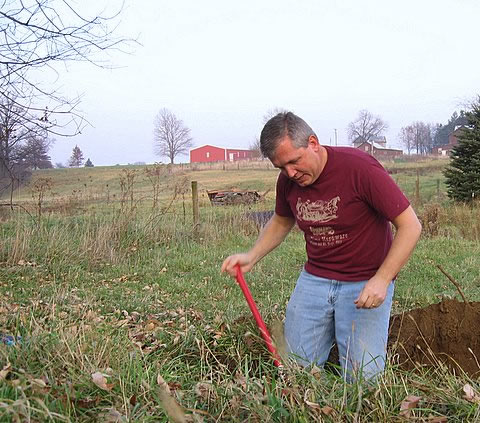I sometimes feel like running is a business is little different from climbing the side of Mt. Everest. As each day passes, the air gets thinner and the stakes get higher. One false step, and we could plunge to our death, pulling our fellow climbers along with us.

A real mountain climber is kept safe by a strong nylon rope, hardened steel pinions and screw-lock caribiners. Here at Lehman’s, we’re kept safe in our “climb” by careful budget planning.
We just completed our 2010 budget. Yes, it’s a little late (since we’re already a few weeks into 2010). We’re late because budget planning is tough work. But, I believe strongly that running a business without a realistic budget is no different from climbing without any safety gear. Climbers can and often do succeed without using safety gear. But, climbing without it is a risk that can lead to death or a crippling.
The most important part of any budget, whether for your household or your business, is accurately determining your income. At Lehman’s, getting a good idea of the income we can expect means we must have a good idea what the economy holds for our future sales. A climber depends on having safety gear with the right load rating. We depend on a budget with accurate sales estimates.
As a result, I’ve been obsessed with studying economic conditions. The way I see it, there are two clearly differentiated ideas about what 2010 will bring.
It seems to me that many believe the economy always bounces back after a recession, and 2010 is no different. In a downturn, manufacturers and retailers do everything they can to reduce inventory. At Lehman’s, we’re no different. We’ve lowered inventory by over 10% since the beginning of 2009, mostly by offering our overstocks at deep discount sale prices.
Unemployment is still at record highs. It certainly doesn’t feel like the recession is over to most of us.
But, our low inventory of merchandise on hand means we have to reorder, and reorder now. Across America, thousands of other retailers are in the same boat. They’ve nothing left to put on the shelf if they don’t reorder now.

According to the folks that believe in an immediate bounce back, all those reorders mean the economy will come roaring back. Orders mean true job creation. Job creation means money will flow again. Things are on the mend!
On the other hand, many economists are saying that things are fundamentally different now. They seem to believe our economy no longer has the capacity to bounce back. This view is apparently held by one of my Facebook Friends, who posted rhetorically, “When do you think the average Roman knew the empire was falling?”
Housing prices haven’t hit bottom. Consumers are trying to pay off their credit cards, not spend more. (Consumer credit has been falling since late 2008.) Commercial real estate is on the verge of creating another devastating financial crisis. The FDIC is bracing for a huge increase in bank failures. The economic power of China and India (“Chindia“) are in the process of forever displacing America. For those folks, our current reality may be as good as it will ever be.
At Lehman’s, our view is somewhere in between. I read somewhere that investor Warren Buffet said recently, “Over the long haul, the US economy is strong and resilient.”
I’m worried about real estate values and how they will affect banks. While I applaud the efforts of families all over America to pay down debt, I worry about what will happen to consumer spending as a result. The unemployment rate here in northeast Ohio is much higher than the national average, and my heart is heavy for all those good folks without a job.
But, I have a lot of faith in the American way of life. One of my Facebook Friends said it best, “I’m excited about … future prospects … Gone are the days of living on the sidelines in Lazyboy recliners. Here today though are the days of accountability, learning self respect and dignity. Time of uncertainty creates tremendous opportunity. Fear is counter productive. The fearful consistently get left behind. Consistently.”
At Lehman’s, we’re betting on gradual improvement throughout 2010. I don’t think it will be a “bounce back” like the first group of economists I wrote about. But, I do think better days are ahead. At the same time, we have to prepare for the possibility that the world has indeed changed.
I think, “Hope for the best. Prepare for the worst.” Let me know what you think!
![]()
Galen Lehman, President, Lehman’s

Click here to join
me on Facebook!





























Insert Standard Disclaimer: I am not an economist, nor have I ever played one on television. There’s a very real possibility that I have absolutely no idea what I’m talking about and am too short-lived, being a member of the human race, to fully comprehend the fact- a distinction I likely share with a great number of other human beings. And with that much out of the way . . .
I think the answer is to be found at two feet and two hundred feet. There’s nothing extraordinarily useful to be found in the middle. As a result, I suspect that “hope for the best. Prepare for the worst” is a reasonable way to go about things. There just needs to be less hoping going on until after the preparing has been tended to.
At two feet there may heartache, hard decisions, triumphs and failures. But this is where we live or where we *should* be living. Plan for tomorrow but not at the expense of today. People are being shaken out of their complacency- myself included. There’ll be casualties but overall how can it be anything less than a good thing?
When people have gotten back in the habit of securing the here and now, back in the habit of acting on the actionable, back to the understanding that they are each responsible for their own little share of “the economy”; then we’ll be heading in the right direction.
At two hundred feet the lines on the graphs become a great deal easier to comprehend as the little valleys and peaks become indiscernible. Civilizations rise and civilizations fall. It gets warmer and it gets colder. There are both shallow and acute ascensions. Minor and major adjustments exist all along that graph. Where we are right now may completely elude me, but I do believe that ignoring the two hundred foot view, specifically what it teaches us about the nature of things, is perilous.
One thought that I’m comfortable with is that we didn’t dig this hole in a single day, year, or decade. I’ve personally watched the process from the sidelines with the rest of the spectators. And it now seems silly, if not outright dangerous, to presume that any single individual, or government, could level that hole in a length of time not approaching the length of time it took to create it.
I don’t believe we’ve hit bottom yet. It’s going to take awhile to incite lasting change and there will be more casualties. Quick fixes will cause more harm than good. However, the spectators will take action when the pain has ceased to be some generalized something they read about and becomes personal. If they utterly fail to do so . . . civilizations have risen and fallen, and it’s been both warmer and colder.
If anyone finds that disquieting, find a horse that needs brushing. At two hundred feet it won’t make a bit of difference, but at two feet it’s great therapy.
Check out this article:
http://www.nytimes.com/2010/01/04/opinion/04krugman.html
Absolutely excellent commentary, for regular folks like ME!
Gonna refer my friends to your column here.